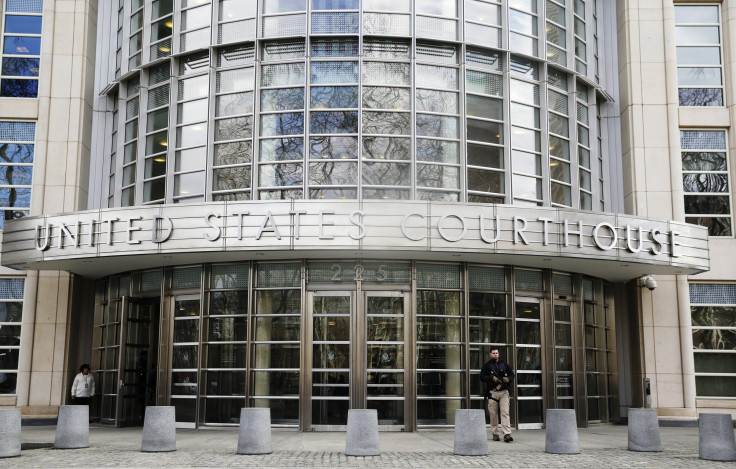Tairod Pugh Update: Unusual Case Of US Air Force Vet Accused Of Trying To Join ISIS Described As Outlier

Former U.S. Air Force mechanic Tairod Nathan Webster Pugh pleaded not guilty in a Brooklyn, New York, federal court Wednesday to charges that included attempting to join the Islamic State militant group in January. But although Pugh joins a list of two-dozen or so other Americans who have allegedly tried to materially support or join the group -- which is also known as ISIS or ISIL -- his case seems to be an isolated one.
Pugh's profile hardly matches those of the other Americans who have allegedly sought to join ISIS, experts and government officials pointed out, while military veterans suggested that Pugh’s case came across as simply bizarre.
“There’s no concern,” Thomas Crosson, a spokesman for the Department of Defense, said of the possibility of other veterans attempting to join the Islamic State group. The criminal complaint filed against Pugh stated that he served from about 1986 to 1990 as an avionics instrument system specialist in the U.S. Air Force. He was assigned to bases first in England and then in Arizona, according to the Air Force.
'A Different Kind' Of Suspect
Karen Greenberg, director of the Center on National Security at Fordham University's School of Law, said that Pugh’s case seemed atypical.
“This is a different kind of terrorist suspect than we’ve seen in the past,” she said, citing Pugh's age and background. At 47, he was much older than the many teenage Americans who have attempted to go overseas to fight for the Islamic State group.
“He seemed to have a persistent desire to go abroad,” Greenberg said, citing the criminal complaint, which noted that in 2002, an associate of Pugh told the FBI that “Pugh had expressed an interest in traveling to Chechnya to [wage] jihad.” The complaint also noted, “In 2001, the FBI received a tip from a co-worker of Pugh’s … that Pugh sympathized with Osama bin Laden” and that he had expressed anti-American sentiments.
Much of what is known about Pugh is contained in the criminal indictment, Greenberg added, but that information alone revealed that “he seems to be somewhat different.” She pointed out that Pugh's psychological state remained undetermined and that there was too little information to determine how or even if his status as a veteran played any role in Pugh’s alleged actions. “It would be really interesting to know what drew this guy," she said.
Pugh’s travels recall other prominent cases of former or current U.S. service members who have fought for or had possible connections to terrorist groups.
In the case of John Walker Lindh, an American who was captured in 2001 at age 20 while fighting for the Taliban in Afghanistan, he originally traveled to Yemen in the late 1990s to study Arabic. In another instance, rumors swirled that Sgt. Bowe Bergdahl, held captive by the Taliban in Afghanistan for five years before being exchanged in 2014 for five Guantanamo Bay prisoners, was a Taliban sympathizer. No connection has been proved. In 2013, former U.S. Army soldier Eric Harroun was found to have been fighting with al Qaeda-affiliated Jabhat al-Nusra in Syria, although his goal in fighting in Syria was reportedly simply to fight the army of President Bashar al-Assad.
It's 'Unfathomable'
Sean Rowe, founder of one of the two groups named Veterans Against ISIS, called it “unfathomable” for anyone, much less a veteran of the U.S. armed forces, to support ISIS. (Rowe's organization recruits former service members to fight and defend Assyrian Christian communities in Iraq or Syria, while the other group seeks to defend the United States against threats from ISIS.)
“Personally, I don’t understand how anyone could be supporting ISIS,” Rowe said.
But he acknowledged that, after leaving the military, U.S. soldiers were often poorly treated. “When they get out, there’s really no support structure for them. If you can’t handle the military and you get out, you’re basically on your own,” he allowed, citing rates of unemployment and homelessness that are significantly higher among veterans than the general population.
Still, Rowe said, for any U.S. veteran to support ISIS as a result of this disgruntlement would be “illogical.”
Marc Raimondi, a spokesman for the U.S. Department of Justice, said he was not aware of any other U.S. veterans who have attempted to join or support the Islamic State group. He said whether or not a person was a veteran, if someone attempted to join ISIS or aid the group, “We’re mandated to stop them.” Approximately 150 Americans have either tried to join or succeeded in reaching the militant group, or have returned to the United States after doing so, Raimondi estimated.
Pugh appeared to have been set on waging jihad for at least a decade, long before ISIS formed. In Cairo in January, when he was about to be deported to the United States, he reportedly told authorities, “The U.S. doesn’t like black Muslims.”
© Copyright IBTimes 2024. All rights reserved.












